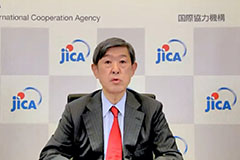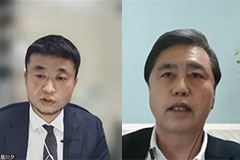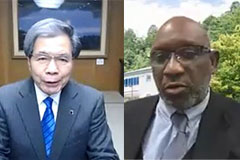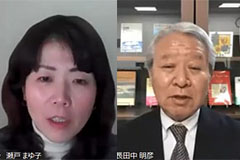Toward an Inclusive Society Where Diverse People, Regardless of Their Nationality, Can Thrive Together: Research Outcomes Discussed at a Symposium on Foreign Worker Acceptance
2022.06.10
On Feb. 3, 2022, JICA Ogata Sadako Research Institute for Peace and Development (JICA Ogata Research Institute) held the online symposium “Achieving Inclusive Society Targets in 2030 and 2040: Supply-Demand Simulation of Foreign Workers and Recommendations Toward Social Cohesion.” Around 500 participants attended.
The symposium opened with remarks by Kitaoka Shinichi, then president of JICA. Kitaoka said that Japan should accelerate foreign worker acceptance in the face of a shrinking population. In 2040, Japan would need four times more foreign workers (6.74 million) than 2020 for sustained economic growth, according to an analysis later explained in the symposium. He noted that statistical data analysis of this kind had surprisingly not been conducted in Japan to date. The global competition to secure foreign workers will soon become intense. Japan should be more aware of the urgency and needs proactive policies based on medium- to long-term perspectives.

Kitaoka Shinichi, then president of JICA, gave the opening remarks
Matsuoka Hiromu from Value Management Institute, a private think tank, reported the outcome of the study which forecasted the demand for foreign workers in Japan and the potential supply of workers from migrant-sending countries as of the target years 2030 and 2040. He warned that Japan would not be able to secure enough foreign workers to achieve its GDP targets, even if more capital investments for automation are made. More specifically, the shortage of foreign workers would be around 630,000 in 2030, and 420,000 in 2040. Kameyama Takuji from Japan Economic Research Institute, another private think tank which jointly conducted the study, shared the suggestions from case studies of 20 Japanese local administrations. He raised two future challenges. One is to improve the institutional environment for support to foreign workers in the areas of basic human rights, social engagement, employment and livelihoods. The other is to build frameworks tailored to the characteristics of each local administration so that these measures can function effectively. Adding to these, Shishido Kenichi, vice president of JICA, presented six challenges identified by the study, and as a way forward, actions to be taken by JICA to realize an enriched and inclusive society where Japanese and non-Japanese people can play active roles together with hopes and a sense of security.
Two members from the research working group gave expert opinions. The first was Korekawa Yu, director of the Department of International Research and Cooperation at the National Institute of Population and Social Security Research, said that whereas most debates on foreign workers in Japan have been dichotomous, as to whether or not to accept them, the significance of the study is that it used numerical data to show the large supply-demand gap of foreign labor. The result estimate is in line with the simulation made by the International Monetary Fund (IMF), making this one of the most reliable estimates available today. Korekawa also noted that this study showed that policies to accept foreign workers is important in addressing Japan’s aging and shrinking population, complementing those to improve productivity and to encourage women and the elderly to participate in the workforce. He said the study highlighted the need to combine policies.

Korekawa Yu, the National Institute of Population and Social Security Research (left) and Menju Toshihiro, the Japan Center for International Exchange
The second was Menju Toshihiro, managing director of the Japan Center for International Exchange, who stated that much has been considered around ”how Japan should accept foreign workers” but the focus should shift to “how Japan can be chosen by them.” Menju noted in this respect that JICA has the ability to look at Japan with external perspectives through its activities in developing countries and it is significant that this study suggested that objective discussions must take place. He also pointed out the importance of linking rural community revitalization with the acceptance of foreign workers and expressed his expectations in talents like Japan Overseas Cooperation Volunteers (JOCV) in making great achievements.
The panel discussion started with a video message from Yamamoto Ichita, governor of Gunma Prefecture. Yamamoto introduced the Prefectural Ordinance for Promotion of Intercultural Co-creation, which came into effect in 2021 to co-create social values with the 60,000 residents of non-Japanese nationalities in Gunma to revitalize the local economy. On COVID-19 pandemic response, he highlighted that the prefecture has been collaborating with various stakeholders such as companies, embassies and non-Japanese communities to overcome challenges around information sharing with foreign residents.
Kabashima Ikuo, governor of Kumamoto Prefecture, explained that out of the 18,000 or so foreign residents in the prefecture, around 3,000 are agricultural technical intern trainees. He remarked that Kumamoto must become an attractive place to remain a popular destination for foreign workers. Reflecting on his own experience as an agricultural trainee in the United States, Kabashima said that to realize this, Kumamoto will improve measures to provide safe and comfortable environments to foreign residents, both for living and working. He added that career development opportunities should also be provided to equip them with skills and values for success.

Kabashima Ikuo, governor of Kumamoto Prefecture (left) and Oussouby Sacko, then president of Kyoto Seika University
Oussouby Sacko, then president of Kyoto Seika University, said that we often talk about the realization of an inclusive society but the crucial point here is to enable foreigners to participate in society instead of treating them as visitors. Instead of leaving foreigners to form their own communities based on their country of origin, it is necessary to create dialogue platforms that enable them to participate in local policymaking as members of local communities, for instance. Oussouby added that career development frameworks to help foreign workers are also needed. For example, frameworks that allow them to switch to different occupations, participate in trainings together with Japanese workers and launch new businesses in Japan. Oussouby concluded by saying that he hopes to see a day will come when they are no longer called “foreign workers.”
Seto Mayuko, chair of the Subcommittee on Migration Policies under the Committee on Industrial Competitiveness, Keidanren (Japan Business Federation), stated that from now on, how to strategically and proactively attract foreign human resources will be the main challenge for Japan and there are two key roles that Japanese companies should play. The first is to mainstream diversity and inclusion in business management. To help foreigners live with comfort and a sense of security, Keidanren will promote the sharing of good practices by pioneering companies. The second is to strengthen the perspective of business and human rights. Seto said that the protection of human rights of foreign workers should be enhanced not only within each business but also throughout supply chains.

Seto Mayuko, Keidanren (left) and Tanaka Akihiko, then president of the National Graduate Institute for Policy Studies (now president of JICA)
Tanaka Akihiko, then president of the National Graduate Institute for Policy Studies, GRIPS (now president of JICA) suggested a way forward for Japan to become the country of choice among foreign workers. He said that we should understand the future direction shown by the study as an opportunity to transform Japan into a more vibrant country, that is, to move on to a society where things are not seen as a simple dichotomic interpretation of foreigners versus Japanese, but rather where diverse people can compete with each other in a friendly environment. In this sense, Tanaka said that the term “co-creative society” is preferable over “inclusive society.”
Finally, reflecting on how the study started, Kitaoka pointed out the need for institutional reform to accept more foreign workers in Japan. He then said that JICA would like to assist various partners who are facing immediate needs to accommodate foreigners at the frontline, like local governments, in raising their voice to improve the status quo. When people from different cultures who speak different languages are in trouble, JICA has the human resources to give them advice and support. Kitaoka added that JICA will continue to work under its ”field-comes-first” motto so that everyone can enjoy working with foreigners and find it a necessary thing, embracing the power of diversity.

事業事前評価表(地球規模課題対応国際科学技術協力(SATREPS)).国際協力機構 地球環境部 . 防災第一チーム. 1.案件名.国 名: フィリピン共和国.

事業事前評価表(地球規模課題対応国際科学技術協力(SATREPS)).国際協力機構 地球環境部 . 防災第一チーム. 1.案件名.国 名: フィリピン共和国.

事業事前評価表(地球規模課題対応国際科学技術協力(SATREPS)).国際協力機構 地球環境部 . 防災第一チーム. 1.案件名.国 名: フィリピン共和国.

事業事前評価表(地球規模課題対応国際科学技術協力(SATREPS)).国際協力機構 地球環境部 . 防災第一チーム. 1.案件名.国 名: フィリピン共和国.

事業事前評価表(地球規模課題対応国際科学技術協力(SATREPS)).国際協力機構 地球環境部 . 防災第一チーム. 1.案件名.国 名: フィリピン共和国.
scroll